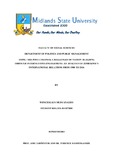Please use this identifier to cite or link to this item:
https://cris.library.msu.ac.zw//handle/11408/2986Full metadata record
| DC Field | Value | Language |
|---|---|---|
| dc.contributor.author | Mudyanadzo, Wenceslaus | - |
| dc.date.accessioned | 2018-03-12T08:48:46Z | - |
| dc.date.available | 2018-03-12T08:48:46Z | - |
| dc.date.issued | 2017 | - |
| dc.identifier.uri | http://hdl.handle.net/11408/2986 | - |
| dc.description.abstract | Zimbabwe inherited a strong, sophisticated and integrated economy on achieving independence in 1980 despite the existence of mandatory United Nations sanctions on the then Rhodesian Government. After independence, Zimbabwe went on to establish an international network of bilateral and multilateral relations with the global community which the previous racist regime of Rhodesia could not achieve. Zimbabwe was also embraced by both western and eastern bloc countries who mobilised international financial resources in the form of grants and soft loans to support post-war recovery programmes, land resettlement and redistribution, rural development, the training of the human resource base of the new nation and the provision of critical infrastructure. As a result of the international goodwill towards Zimbabwe, the country achieved modest Growth Domestic Product (GDP) annual growth rates of between 7.5% in 1980 to 2.1% in 1998. Thereafter, especially between 2000 and 2008, the country experienced unprecedented negative economic growth rates averaging -7% per annum leading to the collapse of the economy, and the general incapacity of political and social sectors of the country to support the nation. The study therefore sought to unravel the cause of the unprecedented decline of the state in economic, political and social terms between 1980 and 2016 despite the existence of multiple bilateral and multilateral relationships with the global community. Such networks were expected to boost the economy and political and social institutions through foreign direct investment, trade, tourism and development assistance initiatives but instead the state continued to decline from 1997 to 2016 except for the period during the Government of National Unity (2009-2013). The research utilised in-depth interviews and unstructured questionnaires to collect data from policy makers, foreign policy and public policy experts and civil society groups which specialise in international relations and public policy issues. The primary sources of data collected were also supplemented by secondary sources of data. The combined theories of realism, liberalism, cognitivism, constructivism, marxism and regionalism reflected in one way or the other the behaviour pattern of Zimbabwe in the international system. The theories of realism, liberalism and regionalism were more dominant in the study. The study concluded that Zimbabwe’s international relations practices which emanated from the country’s public policies and other governance practices were largely to blame for the country’s decline from a strong state to a weak state between 1980 and 2016. The study concluded by pointing out how Zimbabwe could rebuild its international relations profile through re-engagement and policy reform. | en_US |
| dc.language.iso | en | en_US |
| dc.publisher | Midlands State University | en_US |
| dc.subject | Integrated economy | en_US |
| dc.subject | Zimbabwe | en_US |
| dc.subject | International relations | en_US |
| dc.subject | Policy reform | en_US |
| dc.title | The post-colonial challenges of nation-building through international engagement: an analysis of Zimbabwe’s International Relations from 1980 to 2016 | en_US |
| dc.type | Thesis | en_US |
| item.openairecristype | http://purl.org/coar/resource_type/c_18cf | - |
| item.grantfulltext | open | - |
| item.languageiso639-1 | en | - |
| item.openairetype | Thesis | - |
| item.fulltext | With Fulltext | - |
| item.cerifentitytype | Publications | - |
| Appears in Collections: | Theses | |
Files in This Item:
| File | Description | Size | Format | |
|---|---|---|---|---|
| Mudyanadzo thesis final.pdf | Full Text | 2.39 MB | Adobe PDF |  View/Open |
Page view(s)
328
checked on Dec 3, 2025
Download(s)
334
checked on Dec 3, 2025
Google ScholarTM
Check
Items in MSUIR are protected by copyright, with all rights reserved, unless otherwise indicated.



